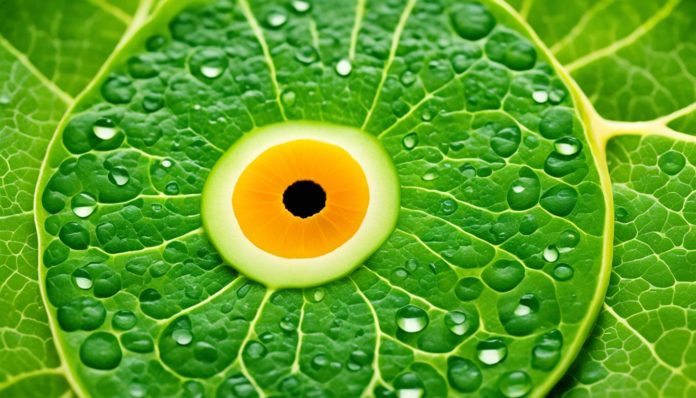Lutein is a key carotenoid found in our eyes, essential for eye health. It acts like a natural sunlight filter, shielding the eyes. This protection helps reduce harms like age-related macular degeneration (AMD), cataracts, and other eye issues.
Eating more lutein can boost your visual skills. You might notice sharper differences between lights and darks and bounce back quicker from bright lights. However, not everyone gets enough lutein from their food. This lack can affect how well they see.
Key Takeaways
- Lutein is a key carotenoid in the eyes, essential for maintaining eye health.
- It serves as a light filter, protecting eyes from sunlight damage.
- Increase in lutein intake can lower the risk of AMD and cataracts.
- Lutein benefits include enhanced visual performance, like improved contrast sensitivity.
- Many adults don’t eat enough lutein-rich foods, impacting vision enhancement.
The Role of Lutein in Eye Health
Lutein is a key nutrient found in the macula, which helps us see details clearly. It works as a blue light filter and as an antioxidant. This is vital for keeping our eyes healthy.

How Lutein Protects the Eyes
Lutein plays a big part in defending our eyes. It fights off harmful molecules and reduces stress caused by oxidation. By doing so, it shields our eyes from damaging blue light. It also helps keep the macula in good shape, promoting overall eye health.
Scientific Evidence Supporting Lutein for Eye Health
Studies on lutein scientific research have shown it’s good for our eyes. Research, like the Age-Related Eye Disease Study (AREDS) by the National Eye Institute, connects lutein with a lower risk of severe macular degeneration as we age. These results prove lutein’s effectiveness in protecting our eye health and fighting vision loss.
Understanding Lutein and Its Sources
Lutein is a vital antioxidant for eyesight but our body can’t make it. This makes it crucial to get it from foods or supplements that have lutein.
Natural Sources of Lutein
Veggies like kale, spinach, and broccoli are rich in lutein. Corn, eggs, and carrots are also great sources. These foods not only offer lutein but also a variety of nutrients that boost our health.

Eating foods rich in these elements helps us enjoy lutein’s eye health benefits. It’s a way to keep our eyesight in top shape.
Dietary Sources vs. Supplements
Getting lutein from foods you eat is great, but some people may find it hard. They might not get enough lutein from their diet due to food choices or higher needs. For them, taking supplements can be a good option.
Remember, there’s a difference in quality and how our body uses lutein from foods versus supplements. Supplements offer a sure way to get enough lutein, depending on what your health needs. Looking at your diet and health can help decide between food sources and supplements for the best eye health.
Top Benefits of Lutein for Vision Support
Research is increasingly showing how important lutein is for our eyes. This carotenoid protects against oxidative stress and boosts vision.
Prevention of Macular Degeneration
Lutein helps fight macular degeneration, a major cause of vision loss. It targets the retina’s central part, known as the macula. Here, lutein acts as a shield, blocking harmful blue light and damage from oxidation.
By eating foods or taking supplements rich in lutein, you can safeguard your eyes. Doing so lowers the risk of eye diseases in the future. Lutein’s role in eye health shows why it’s key in diets for good vision.
Enhanced Visual Performance
Lutein isn’t just about preventing diseases; it also sharpens your vision. By improving clarity and how we see contrast, lutein helps us see better.
It even helps with issues like glare and speeds up how fast we process visuals. Lutein is vital for keeping our eyes working their best, whether for everyday tasks or more demanding visual activities.
Lutein Supplements: What You Need to Know
Many lutein supplements are on the market. You need to consider several things when choosing one. This lutein supplement guide helps you pick lutein products and the right lutein dosage for your eyes.
Choosing the Right Supplement
Picking the right lutein product means looking at the ingredients, the brand’s reputation, and extra elements like zeaxanthin that help your body absorb it better. Brands like NOW Foods and Jarrow Formulas are reliable. They always tell you what’s in their supplements.
Dosage Recommendations
The best lutein dosage can vary. Research says taking 10 mg to 20 mg daily is good for your eyes. Yet, it’s best to ask a doctor for advice. This is especially true if you have eye issues or take other meds.
| Brand | Lutein Content (mg) | Additional Ingredients |
|---|---|---|
| NOW Foods | 10 mg | Zeaxanthin |
| Jarrow Formulas | 20 mg | Zeaxanthin, Vitamin E |
Lutein-Rich Foods for Eye Health
Adding lutein-rich foods to your meals is a great move for your eyes. These foods pack nutrients that keep your lutein levels up. This is key to strong eye health nutrition.
Top picks for dietary lutein include green veggies like kale, spinach, and collard greens. You’ll also find lutein in yellow and orange fruits and veggies. Think corn, carrots, and orange bell peppers.
| Food Source | Lutein Content (mg per 100g) |
|---|---|
| Kale | 39.6 |
| Spinach | 12.2 |
| Eggs (yolk) | 0.25 |
| Orange Bell Peppers | 0.5 |
| Corn | 0.3 |
Eggs, especially the yolk, shine as a source of dietary lutein. Eating a mix of these lutein-rich foods helps ensure you’re getting plenty. This supports your eye health and vision protection. Try to eat different kinds regularly for lasting eye health.
Importance of Lutein in Aging Eyes
As we get older, our eyes can easily get hurt by stress and blue light. Adding lutein to our diets helps fight this and keeps our eyes healthy for a long time.
How Lutein Supports Aging Eyes
Lutein is a strong antioxidant that protects our aging eyes. It filters out bad blue light and fights off stress. This keeps our eyes’ fine parts safe, helping us keep our vision sharp as we age.
Studies show lutein really helps with eye problems as we get older. It lowers the chance of getting AMD and cataracts, two main reasons older people lose their sight. So, lutein is super important for keeping our eyes in good shape.
Long-term Benefits of Lutein
Lutein does more than just protect our eyes right now. Eating it regularly can also slow down AMD. Plus, it helps our eyes stay healthy as we get older. To enjoy these perks, make sure lutein is part of your diet or take supplements.
But lutein doesn’t just help with eye health. Research finds it could help our brains work better too. This could mean staying sharper and healthier overall.
To get the full range of health benefits, consider eating a variety of nutrients. Check out this related article on essential nutrients for more tips.
Lutein and Macular Degeneration
Research in eye health has shown that lutein can protect the macula from damage. This is especially true for macular degeneration. The AREDS2 studies show lutein, along with zeaxanthin, improves the macula. This can help stop harmful blue light and protect against age-related damage.
Lutein doesn’t cure macular degeneration but is key for managing it. It’s beneficial for those at risk or in early stages. Adding lutein to your diet or as a supplement can help protect the macula. This wards off damage from light and stress.
Below is a list of important nutrients and their benefits:
| Nutrient | Benefit |
|---|---|
| Lutein | Protects macula, improves MPOD, filters blue light |
| Zeaxanthin | Works with lutein to enhance benefits, antioxidant properties |
| Vitamin C | Supports overall eye health, reduces oxidative stress |
| Vitamin E | Protects cell membranes, supports retinal health |
| Zinc | Aids in vitamin A absorption, maintains retina health |
Taking lutein can make a big difference for your eyes, especially with macular degeneration. If you’re thinking about it, talk to a doctor. They can help you find out how much to take and fit it into your eye care routine.
Understanding the Optimum Lutein Dosage
Finding the right lutein amount for eye health requires looking at research and guidance on lutein dosage. Though there’s no set lutein RDA, studies show taking 6 mg to 20 mg daily benefits eye health, especially for certain conditions.
“Numerous studies have highlighted the importance of lutein in maintaining optimal eye health, particularly in preventing age-related macular degeneration and enhancing visual performance.” — American Optometric Association
To take in lutein effectively, mix dietary sources with supplements if needed. Speaking with healthcare experts can help tailor lutein intake to your health needs.
| Lutein Dosage | Benefit | Sources |
|---|---|---|
| 6 mg/day | Basic Eye Health Maintenance | Green Leafy Vegetables, Eggs |
| 12 mg/day | Enhanced Visual Performance | Corn, Orange Peppers |
| 20 mg/day | Support for Eye Conditions | Supplementation, Spinach |
Getting the right lutein dosage boosts eye health and helps protect against age-related macular degeneration. Following the suggested lutein doses can help maintain your eyes’ health based on your specific needs.
Potential Side Effects of Lutein
Lutein is usually safe, especially within recommended doses. Still, knowing the lutein risks and their effects on health is important.
Are There Any Risks?
Side effects from lutein can happen, but it’s rare. They can include:
- Allergic reactions
- Interactions with medications
- Carotenodermia, a harmless yellowing of the skin from high doses
Managing Potential Side Effects
Sticking to dosage advice is key to manage lutein intake. It’s smart to see a health professional regularly to avoid and manage any lutein risks. It’s also vital to check how new supplements might react with current meds.
| Guideline | Description |
|---|---|
| Adhere to Dosage | Stick to the safe intake levels to reduce risks. |
| Consult Professionals | Get regular advice from healthcare professionals about lutein. |
| Monitor Reactions | Watch for any negative effects or drug interactions. |
Conclusion
Lutein is key for keeping our eyes healthy. It is a carotenoid found in fruits and veggies. It fights against eye problems like macular degeneration and cataracts.
Lutein works by protecting our eyes from damaging light. Adding it to your diet or taking supplements can help. You can see improvements in vision if you have maculopathy. You can learn more from this detailed study.
It’s important to know the right amount of lutein to use and its side effects. Taking lutein regularly is good for your eyes and overall health. For keeping your eyesight sharp throughout your life, make sure you get enough lutein.
FAQ
What are the benefits of lutein for eye health?
Lutein is key for keeping our eyes healthy. It shields our eyes from sunlight damage, helping prevent conditions like age-related macular degeneration (AMD) and cataracts. It also boosts vision by improving contrast sensitivity and helping eyes recover from glare.
How does lutein protect the eyes?
Lutein gathers in the macula, which is crucial for central vision. It filters harmful blue light and works as an antioxidant. This action fights off free radicals and lowers the risk of chronic eye diseases.
What scientific evidence supports lutein for eye health?
Many clinical studies back the benefits of lutein for eyes. The Age-Related Eye Disease Study (AREDS) by the National Eye Institute linked lutein intake with a reduced chance of advanced AMD.
What are the natural sources of lutein?
Green leafy veggies like kale, spinach, and broccoli are full of lutein. Corn, eggs, and carrots are also good sources. Eating these foods helps keep lutein levels up for eye health.
Should I take dietary sources or supplements for lutein?
Eating foods with lutein is good, but sometimes supplements are necessary. They help reach the needed lutein intake, especially for those with special diets or needs. Choosing between food and supplements depends on your lifestyle, diet, and health.
How does lutein prevent macular degeneration?
Lutein can help fend off AMD and might slow its progress. It does this by boosting the macular pigment in the eye.
How does lutein enhance visual performance?
Lutein betters visual performance by increasing the macular pigment density. This helps protect vision and maintain clarity, especially in low light or when looking at screens.
How do I choose the right lutein supplement?
Choosing a lutein supplement? Look at its ingredients, the brand’s reputation, and if it has zeaxanthin to help absorption. Always talk to a healthcare expert for advice tailored to you.
What is the recommended dosage of lutein?
Taking 10 mg to 20 mg of lutein daily can benefit eye health. But, it’s important to get advice from a healthcare provider on the right dose for you.
What are some lutein-rich foods for eye health?
For foods high in lutein, eat green leafy vegetables, yellow and orange fruits and veggies, and eggs. These foods help support eye health.
Why is lutein important for aging eyes?
Lutein, with its antioxidant power, helps aging eyes stay healthy. It reduces the chance of AMD and supports good eye health. It might also keep the brain functioning well.
How does lutein affect macular degeneration?
Lutein boosts the optical density of the macular pigment. This helps screen out harmful blue light, playing a key role in AMD management.
What is the optimum lutein dosage?
There’s no fixed dose for lutein, but studies recommend at least 6 mg a day. Up to 20 mg may be needed for certain eye conditions. Always consult a healthcare provider for personalized advice.
Are there any side effects of lutein?
Lutein is generally safe within suggested amounts. Side effects can include allergies, drug interactions, and yellow skin (carotenodermia). Follow dosage guidance and check with a healthcare expert.


